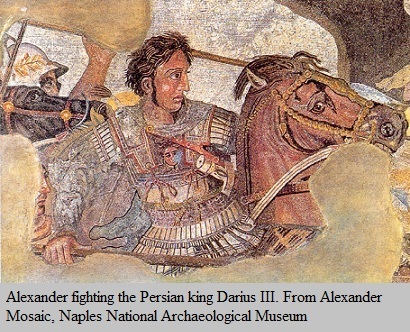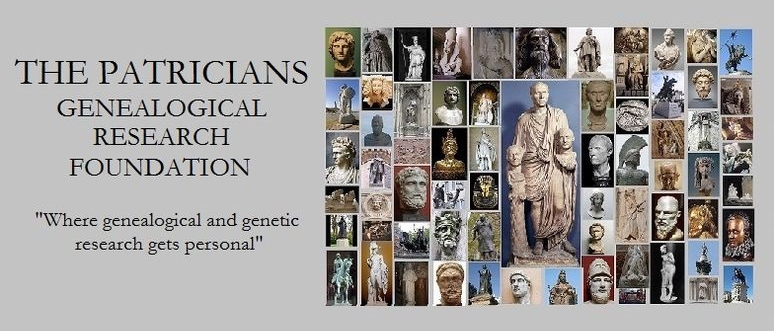







After the death of Alexander the Great of Macedonia (356 – 323 BC, a power struggle to succeed him ensued amongst his generals, principally because he left no clear-cut heirs. The Partition of Triparadisus (321 BC), which was a power-sharing agreement, divided the Macedonian Greek Empire between them. Alexander the Great’s nephew and aide-de-camp, Soter Ptolemy I (367 – 283 BC), was awarded Egypt (known later as the Ptolemaic Empire). Seleucus I Nicator (359 – 281 BC), Alexander’s agnatic cousin and agnatic forebear of Antiochus III Seleucid, Emperor of the Seleucid Greek Empire, was granted Babylon (known later as the Seleucid Empire).
Cleopatra VII Thea Philopater (69 – 30 BC) was the last pharaoh of the Ptolemaic Kingdom of Egypt. Her death signaled the demise of the Ptolemaic dynasty that favorably ruled Egypt for nearly three centuries. Afterward, Octavian killed her son Caesaron, a potential heir to the throne, as an august herald of the advent of Roman Egypt that also portended him as the first Emperor of Rome. Adding Egypt to the Roman Empire’s territorial portfolio also capped the end of the Macedonian Greek Empire, mainly as a consequence that the fractured confederacy previously failed to marshal a leader of Alexander the Great’s stature as a conqueror of unparalleled gift as a military commander. Moreover, one can only reasonably speculate as to whether or not Alexander would have conquered what was to become the Roman Empire had he lived to old(er) age. Alas, only he would have had that ambition and presence of mind to succeed before the advent and rise of the Roman Empire.
His wife Roxane was a descendant of Cyrus the Great (600 – 530 BC), the primogenitor of the Persian Achaemenid dynasty. His grandson Xerxes I “The Great” Achaemenid (510 – 465 BC) was the first foreign ruler to sack Athens before the advent of Alexander the Great. Alexander, of course, sacked Persepolis after the Battle of Gaugamela (331 BC). The defeat of Darius III marked the end of the Achaemenid empire and the establishment of Alexander as Shahanshah of Persia.
Legend has it that Frisians inhabited Friesia since the time of the Flood. They immigrated to Punjab, India as colonists during the 14th century B.C. Alexander enlisted them as mercenaries when he invaded India. At his urging, they eventually returned to the Friesia soon after his death. Adel I Friso ( – 245 BC) became the first dynastic king of Friesland upon their return during the 3rd century B.C. (Redbad “The Pagan”, 9th King of Friesland (670 – 719), was his agnatic descendant).
Stateira (346 – 323 BC) and her sister, who were agnatic descendants of Xerxes I and daughters of Darius III were taken captive by Alexander after their father’s defeat at the Battle of Gaugamela. He treated them well and took Stateira as his second wife. She was killed by Roxane.
His victory at the Battle of Gaugamela (331 BC) is ranked #3 in The Fifteen Decisive Battles of the World (1851), Sir Edward Shepherd Creasy. He’s ranked #33 in Hart’s Most Influential People in History.
Alexander is the eponym of Alexandria, Egypt.
Alexander was an agnatic cousin of Antiochus III Seleucid, Emperor of the Seleucid Greek Empire (223 – 187 BC), Cleopatra VII, Queen of the Ptolemaic Kingdom of Egypt (69 – 30 BC), and Marcus Antonius, General, Triumvir of the Roman Republic (83 – 30 BC) They were all agnatic descendants of the legendary Aegyptus, King of Egypt.
He’s ranked #33 in Hart’s Most Influential People in History – Top 500 List (125).
Related blog articles:
Historically Noted Military Commanders
The Fifteen Decisive Battles of the World (1851), Sir Edward Shepherd Creasy
Alexander the Great of Macedonia
Birth 21 Jul 356 BC in Pella, Macedon
Death 11 Jun 323 BC in Babylon
Ancestry.com citation/Lineages
73rd great-grandfather SELEUCID-SCYLFINGS-YNGLING-DUNKELD-PLANTAGENET-HOWARD-WOOD-COLLINS
75th great-grandfather MANOGAN-COELING-DOL-FITZALAN-HOWARD-WOOD-COLLINS
SOURCES
Aegyptus – Ancient Greece Reloaded
The Patricians, A Genealogical Study – Ebook Editions (Epub, PDF & Kindle) US$5.95


The Patricians, A Genealogical Study – Ebook Editions (Epub, PDF & Kindle) US$7.95


24 replies on “Alexander the Great of Macedonia (356 – 323 BC) King of Macedon, Hegemon of the Hellenic League, Shahanshah of Persia, Pharaoh of Egypt, Lord of Asia”
[…] Alexander the Great of Macedonia (356 – 323 BC) 4GGF […]
LikeLike
[…] Alexander the Great of Macedonia (356 – 323 BC) 4GGF […]
LikeLike
[…] Alexander the Great of Macedonia (356 – 323 BC) […]
LikeLike
[…] Alexander the Great of Macedonia (356 – 323 BC) 4GGF […]
LikeLike
[…] Alexander the Great of Macedonia (356 – 323 BC) 4GGF […]
LikeLike
[…] Alexander the Great of Macedonia (356 – 323 BC) 4GGF […]
LikeLike
[…] Alexander the Great of Macedonia (356 – 323 BC) […]
LikeLike
[…] Alexander the Great of Macedonia (356 – 323 BC) 4GGF d […]
LikeLike
[…] Alexander the Great of Macedonia (356 – 323 BC) […]
LikeLike
[…] Alexander the Great of Macedonia (356 – 323 BC) […]
LikeLike
[…] Alexander the Great of Macedonia (356 – 323 BC) […]
LikeLike
[…] of Aegyptus, the legendary forbear of the Ptolemaic Kingdom (305 – 30 BC) of Egypt. Alexander the Great of Macedonia (356 – 323 BC) and Antiochus III Seleucid, Emperor of Seleucid Greek Empire (223 – 187 BC) were their […]
LikeLike
[…] Alexander the Great of Macedonia (356 – 323 BC) […]
LikeLike
[…] Alexander the Great of Macedonia (356 – 323 BC) […]
LikeLike
[…] Alexander the Great of Macedonia (356 – 323 BC) […]
LikeLike
[…] Alexander the Great of Macedonia (356 – 323 BC) […]
LikeLike
[…] Alexander the Great of Macedonia (356 – 323 BC) […]
LikeLike
[…] Alexander the Great of Macedonia (356 – 323 BC) […]
LikeLike
[…] Alexander the Great of Macedonia (356 – 323 BC) […]
LikeLike
[…] Alexander the Great of Macedonia (356 – 323 BC) […]
LikeLike
[…] Alexander the Great of Macedonia (356 – 323 BC) – King of Macedon, Hegemon of the Hellen… […]
LikeLike
[…] Alexander the Great of Macedonia (356 – 323 BC) – King of Macedon, Hegemon of the Hellen… […]
LikeLike
[…] Alexander the Great of Macedonia (356 – 323 BC) – King of Macedon, Hegemon of the Hellen… […]
LikeLike
[…] time of the Flood. They immigrated to Punjab, India as colonists during the 14th century B.C. Alexander the Great enlisted them as mercenaries when he invaded India. At his urging, they eventually returned to […]
LikeLike